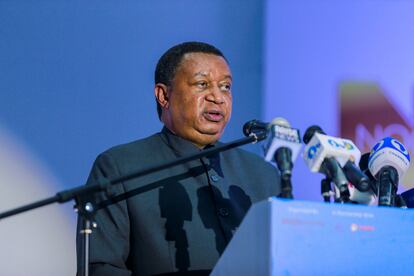Mohammad Barkindo, this Tuesday, at the Nigeria Oil & Gas 2022 summit. AFOLABI SOTUNDE (REUTERS)
The secretary general of the Organization of Petroleum Exporting Countries (OPEC), the Nigerian Mohammad Barkindo, has died this Tuesday at the age of 63 in Abuja, as reported on Wednesday by Mele Kyari, executive director of the national oil company of the African country (NNPC). ).
His sudden death came just hours after giving the keynote speech at the Nigeria Oil & Gas energy conference and meeting with Nigerian President Muhammadu Buhari.
The causes of death have not yet been disclosed.
“We lost our beloved doctor Mohammad Sanusi Barkindo.
He died at eleven o'clock last night, July 5, ”Mele Kyari wrote on Twitter.
"This is a great loss for his family, for the Nigerian National Petroleum Corporation [NNPC], for OPEC and for the entire global energy community."
Barkindo had just moved permanently to Abuja, where he was preparing his professional future after closing his long period in OPEC.
We lost our esteemed Dr Muhammad Sanusi Barkindo.
He died at about 11pm yesterday 5th July 2022. Certainly a great loss to his immediate family of him, the NNPC, our country Nigeria, the OPEC and the global energy community.
Burial arrangements will be announced shortly.
— Mele Kyari (@MKKyari) July 6, 2022
OPEC+ architect, with Russia
Barkindo's double mandate at the head of the cartel - led
de facto
by Saudi Arabia, and in which energy powers such as Iran, Iraq, Algeria, the United Arab Emirates, Libya, Venezuela or Nigeria itself also participate - began in August 2016. A few months later, the so-called OPEC+ was created, an expanded version of the club that also included Russia, in whose birth it played an essential role.
Six years later, and not being able to renew the position (two periods of three years is the maximum established in the statutes), he was going to be replaced at the end of this month by the Kuwaiti Haitham al-Ghais.
Graduated in Political Science, Barkindo had a postgraduate degree in Petroleum Economics from the University of Oxford (United Kingdom), as well as an MBA from the University of Washington.
Most of his professional career had been spent in positions of responsibility in energy entities in his country and, especially, in the powerful NNPC, the true transmission belt of Nigeria's oil policy, by far the greatest African power.
For almost a quarter of a century, between 1986 and 2010, the Nigerian technician was the delegate of the Nigerian Government to OPEC, whose operation he controlled perfectly long before assuming the General Secretariat.
Already in office, he had to navigate one of the most complex periods in his history, marked by the pandemic —which plunged the price of crude oil to historical lows, even temporarily taking it to negative ground— and, ultimately, by the war that began by Vladimir Putin in Ukraine, which has literally turned international energy markets upside down.
Known for his diplomatic style, Barkindo managed to temper spirits and unite the wills of the different members of the club at times when discrepancies were at their maximum.
In that last stage, the discrepancies revolved, above all, around the question of whether or not the main exporters of crude oil in the world should increase their production to stabilize the markets and relax prices.
A debate that remains unresolved, but in which the governments that see little room for maneuver from the point of view of production and that believe that caution is best are imposing their criteria.
In recent months, the Vienna, Austria-based organization has chosen to maintain or only slightly increase the current production rate, with only slight increases in the second half of this year.
All this, despite high demand accelerated by the post-pandemic economic recovery and growing supply constraints stemming from the Russian invasion of Ukraine, which has put Moscow's oil out of the picture in most of the West, has forced endless of countries to look for alternative suppliers and its price has skyrocketed.
last speech
In his final speech, delivered at the Abuja energy conference on Tuesday afternoon, Barkindo said the oil and gas industry is "under siege" due to underinvestment.
A situation, he said, that could be alleviated if Iran and Venezuela are allowed to increase production, two countries that are subject to Western sanctions and whose situation has changed radically with the explosion in crude oil prices in recent months: their competition in the market international is today more necessary than ever.
In his speech, the head of OPEC also lamented the "fragmentation" of global cooperation in the field of energy and stressed that "the new regional alignments threaten to reverse years of progress towards the creation of a more stable and interconnected energy system" .
“We cannot allow multilateral energy cooperation and global energy security to become geopolitical collateral damage,” he cried.

